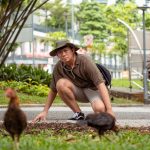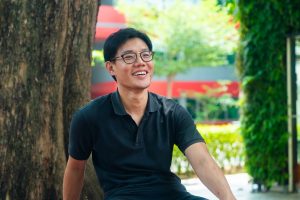All Images by Xue Qi Ow Yeong for RICE Media
With an e-reader and headphones in one hand, Ashish Xiangyi Kumar strolls into a cafe at Woodlands MRT station on a Friday morning.
Beyond the sparsely occupied tables and the gentle morning sunlight filtering through lies the bustling walkway outside the café, teeming with the rhythm of morning traffic. Singaporean commuters, clad in office attire and engrossed in their phones, hurriedly make their way towards nearby MRT gantries.
Slightly over a month ago, Ashish was part of the morning rush hour.
Back then, he would have embarked on an hour’s train journey to the Ministry of Communications and Information (MCI) at Clarke Quay, where he was a Senior Manager at the MCI’s Digital Strategy Office.
That was, until he retired on February 13 this year. At the age of 31.

“I retired because life is brutally and hilariously short, and I can’t find it in me to spend a second of it doing something other than what I love,” Ashish, the early retiree, remarks bluntly.
He has always been uninterested in the conventional life of a working adult. In contrast to so many of his peers, Ashish is indifferent about moving up the career ladder. He was intrigued—and increasingly disturbed—by the idea that we spend so much of our time at work instead of pursuing our interests.
He lays it all out with the typical self-assuredness of a seasoned orator.
I learn why. In 2015, still a student at the University of Cambridge, he was crowned the best speaker at the World Universities Debating Championship.
Two years later, he found himself at his first job in the civil service—a role as Country Officer at the Ministry of Foreign Affairs (MFA) headquarters.
His work involved receiving information from Singapore’s foreign missions and “putting it in a form useful for Singapore’s policymakers.” Sometimes, it involved logistics and event organisation—making sure that name plates for visitors were printed correctly or a motorcade was lined up in the right order, for instance.
“In my last few postings, I was objectively having a great time. Very, very interesting work. Fantastic bosses and co-workers. But it didn’t make the feeling [about work] go away,” he explains, settling into his seat.
“Never at any point in my life have I looked at an adult working in a conventional job and thought, ‘Oh, that looks interesting.’ I’ve never had any interest in or attraction to that.”

A Retiree on the Nature of Work
By conventional Singaporean metrics, Ashish is the ideal ‘product’ of a meritocratic education system.
He seems to embody what conventional Singaporean parents dream for their children—academic excellence and an iron rice bowl in the civil service.
At Dazhong Primary School, he was a top PSLE scorer (278, if you’re wondering) and Singapore’s top Indian pupil in 2004. He then enrolled in Raffles Institution; received an Overseas Merit Scholarship with his A Level Results; and then graduated second in his class with a law degree from the University of Cambridge. After which, he returned to the Ministry of Foreign Affairs to serve his six-year bond.
In a time when Singaporeans worry about job security, early retirement from the civil service seems ludicrous, especially for someone with as much smarts as Ashish.
No one else but Ashish would dream about being an early retiree if they found themselves in a similar position. Six months into his MFA job, he started having concrete thoughts about how to make early retirement happen.
“But that probably was a reaction to just how gruelling the work there was. It wasn’t unusual to be in the office until two or three in the morning,” Ashish clarifies.
“My work was meaningful. But in the end, something other than myself determined what time I got up every morning and how I spent the finite hours of this one and only life I have.”
‘Happily free’ is Ashish’s LinkedIn tagline. It’s almost as if he’s proclaiming to the world that, as a retiree, he has finally escaped the matrix—and with more than enough time to spare.

“I think it’s terrifying to wait until you’re 60 to give yourself permission to be free. By that time, already looking backwards, not forwards. A lot of life to remember; not that much left to live.”
Work is the furthest thing from Ashish’s mind these days. He leans back in his chair and sips his iced latte, unconcerned. After all, he doesn’t have anywhere to be or anywhere to go for the day.
He simply has to be.
The Meritocratic Ladder
Anyone else might mistake Ashish for a recluse.
Judging from his cynical sentiments about the nature of work, it seems contradictory to accept a scholarship which tied him to an organisation after graduation—essentially guaranteeing his future loyalty and labour in exchange for financial support.
“This narrative that academic excellence matters almost more than everything else was sold to me since primary school. You don’t just throw off the shackles overnight,” he answers.
“In Raffles Institution, I was told that getting a government scholarship is a sign that you’ve made it. But the larger factor was that I thought it would be really amazing to study overseas, meet people from other countries, and be independent.”
Without the scholarship, studying overseas would not have been financially viable for Ashish. He describes his family as “financially ordinary.” His mother is a teacher at Wellington Primary School in Sembawang, and his father works at a Christian missionary organisation.
Strangely, it was Ashish’s four years at Cambridge that helped him envision a different life for himself.

“I realised that this thing I’ve been told to treasure is just another thing in the world, right? No one is looking at me and going, ‘Oh wow, a government scholarship.’ I realised that in most countries, government scholarships mean nothing.”
“People live very happy, fulfilled, and flourishing lives entirely outside the frameworks you’ve been brought up in.”
That being said, Ashish declares unabashedly that if he could go back in time, he would have still taken the scholarship. It was the best choice for him at the time, he reflects.
The Privileges of an Early Retiree
Even in early retirement, Ashish has many pursuits—ones common to elderly retirees.
He reads or writes. Occasionally, he uploads onto his YouTube channel dedicated to pure, unadulterated classical music. Recently, he took up badminton and long-distance hiking.
The elephant in the room remains. Not everyone gets to be an early retiree. Most pertinently, the government announced that Singapore will raise the retirement age to 64 in 2026. With the rising cost of living, some are doing the opposite of retirement—taking on extra jobs in their golden years to make ends meet.
“If someone told me I’m privileged, I’d agree with them, but not in the sense that people mean. I’m privileged to have worked in the best-paying civil service in the world. I’m privileged to have the personality and desires I have because they make life easy.”
Ashish reveals that he spent very little of what he earned. A government scholarship meant that he never had any financial liabilities.
“But less than what a lawyer would earn and significantly less than someone at Meta or Bytedance, for sure,” he clarifies.

He estimates that his biggest regular monthly expenses add up to around $1,000. He spends little on anything else. Maybe “two expeditions to Uniqlo each year, and that’s basically it”, he remarks. He has no plans to get married or find a partner, and he currently lives with his parents. Besides travel, he doesn’t plan to do “anything expensive in life.”
And he doesn’t make any wild investments in the stock market. “I invest boringly. I don’t attempt to predict anything in the market apart from the fact that the S&P 500 goes up rather than down in the very long run.”
An Unnatural Condition
The lunch crowd enters. More Singaporeans, all in office wear, stream into the cafe. Ashish glances at his now-emptied cup of iced coffee. He will get lunch before returning home for a nap before going for a run at Woodlands Waterfront in the evening.
“I suspect that employment—the condition of being commanded by a superior in this specific social context called the workplace, under pain of financial punishment—is not an essentially natural condition,” Ashish elaborates.
“Homo sapiens has been around for 300,000 years. We’re just overdeveloped apes with opposable thumbs and nuclear weapons. This can’t really be the end-point of it all, surely? Ideally, we should be aiming for 100 percent unemployment.”

Very few Singaporeans find themselves in such privileged positions as Ashish. Not many people can amass such a comfortable nest egg in such a short time. Being an early retiree remains a distant dream for most Singaporeans, let alone eradicating fears of unemployment.
His perspective on work may not align with ours, and many Singaporeans might find the idea of having ample free time unsettling. After all, one of the arguments for work is that it provides people with a sense of purpose in life.
Nevertheless, regardless of our views on work, we can at least agree that some separation should exist between work and life. Our identities need not be so closely tied to work—work need not be our only purpose. Ashish might be an extreme version of this belief, but he reminds us there is more to life than work. Even when it doesn’t feel like it sometimes.
Ashish gathers his e-reader and headphones, scans the cafe and makes for the exit. The morning glow dissipates and reappears as a harsh, overbearing glare.
Workers move along the corridor, into and out of the cafe. It will be another six hours before the end of the official workday. For many, it might just be the start of overtime—Singapore remains one of the most overworked countries in the Asia-Pacific region.
“Countries don’t own people. Communities don’t own people. Only you own yourself. If you’re wondering whether to retire, I’d say don’t decide based on what others think you should do.”
“I don’t presume for a moment that everyone has the same circumstances and life plans as me. But I can say this: if for some reason everyone chooses to retire early, Singapore and society in general, will deserve it.”







